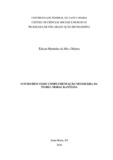| dc.creator | Difante, Édison Martinho da Silva | |
| dc.date.accessioned | 2016-09-26 | |
| dc.date.available | 2016-09-26 | |
| dc.date.issued | 2016-03-21 | |
| dc.identifier.citation | DIFANTE, édison Martinho da Silva. HIGHEST GOOD AS NECESSARY COMPLEMENT TO KANT‟S MORAL THEORY. 2016. 183 f. Tese (Doutorado em Filosofia) - Universidade Federal de Santa Maria, Santa Maria, 2016. | por |
| dc.identifier.uri | http://repositorio.ufsm.br/handle/1/3870 | |
| dc.description.abstract | The following thesis aims at offering a broad and systematic interpretation of the doctrine highest good. Based on that, we defend that the idea of highest good represents a necessary complement to Kant‟s moral theory. In order to defend that, it is needed to present the context in which the idea of highest good is introduced by Kant, observing that in this period there was no moral theory itself yet, which was based on the autonomy of the will. It is important to emphasize that both during development and among the different phases of critical philosophy the idea of highest good has been there. Thus, it is essential to analyze the relationship between the idea of highest good and the theory of morality, taking into consideration that sometimes the concept seems to be unstable regarding the foundations of the moral theory. It happens that, although the concept or idea of highest good has already its legitimacy ensured since the beginning of critical period, it is from a practical perspective of reflective judgment that it will become an essential part of the moral theory and of the architectonic of pure reason. On one hand, the following thesis has the objective of rebuilding Kant‟s argumentation regarding the idea of highest good during the critical period and, on the other hand, showing that the concept of highest good does not compromise the fundamental principle of morality. Besides that, considering that the idea of highest good is constantly retaken by Kant himself in his critical philosophy, we defend that the highest good not only has an assured place, but a privileged one in moral philosophy. Even though the highest good is an object of faith for practical pure reason moral it theologically complements moral theory representing pure reason ultimate goal for rational human beings. | eng |
| dc.description.sponsorship | Coordenação de Aperfeiçoamento de Pessoal de Nível Superior | |
| dc.format | application/pdf | por |
| dc.language | por | por |
| dc.publisher | Universidade Federal de Santa Maria | por |
| dc.rights | Acesso Aberto | por |
| dc.subject | Sumo Bem | por |
| dc.subject | Teoria moral | por |
| dc.subject | Complementação | por |
| dc.subject | Highest good | eng |
| dc.subject | Moral theory | eng |
| dc.subject | Complement | eng |
| dc.title | O Sumo Bem como complementação necessária da teoria moral kantiana | por |
| dc.title.alternative | Highest good as necessary complement to Kant's Moral Theory | eng |
| dc.type | Tese | por |
| dc.description.resumo | A presente tese procura oferecer uma interpretação abrangente e sistemática da doutrina do sumo bem. Nessa perspectiva, defende-se que a ideia do sumo bem representa uma complementação necessária à teoria moral kantiana. Para tal empreendimento faz-se necessário apresentar o contexto no qual a ideia do sumo bem é introduzida por Kant, observando que nesse período ainda não existia uma teoria moral propriamente dita, baseada na autonomia da vontade. Cabe ressaltar que tanto no desenvolvimento quanto nas diferentes etapas da filosofia crítica a ideia do sumo bem esteve presente. Com efeito, torna-se imprescindível analisar a relação entre a ideia do sumo bem com a teoria da moralidade, tendo em vista que em alguns momentos esse conceito parece instável no tocante à fundamentação da teoria moral. Ocorre que, embora o conceito ou ideia de sumo bem já tenha a sua legitimidade assegurada desde o início do período crítico, é a partir de uma perspectiva prática da faculdade de julgar reflexionante que ele passa a se constituir como uma parte indispensável da teoria moral e da arquitetônica da razão pura. A tese tem, por um lado, o objetivo de reconstruir a argumentação kantiana referente à ideia do sumo bem no período crítico e, por outro lado, demonstrar que essa ideia do sumo bem não compromete o princípio fundamental da moralidade. Além disso, visto que a ideia de sumo bem é constantemente retomada pelo próprio Kant em sua filosofia crítica, defende-se que a ideia do sumo bem não somente tem um lugar assegurado, mas um lugar privilegiado na filosofia moral. Mesmo que o sumo bem seja um objeto de fé da razão prática pura moral ele complementa teleologicamente a teoria moral representando o fim último da razão pura para os seres racionais humanos. | por |
| dc.contributor.advisor1 | Hamm, Christian Viktor | |
| dc.contributor.advisor1Lattes | http://buscatextual.cnpq.br/buscatextual/visualizacv.do?id=K4788328H8 | por |
| dc.contributor.referee1 | Chagas, Flávia Carvalho | |
| dc.contributor.referee1Lattes | http://lattes.cnpq.br/3056277862547671 | por |
| dc.contributor.referee2 | Krassuski, Jair Antônio | |
| dc.contributor.referee2Lattes | http://buscatextual.cnpq.br/buscatextual/visualizacv.do?id=K4762903P7 | por |
| dc.contributor.referee3 | Rossatto, Noeli Dutra | |
| dc.contributor.referee3Lattes | http://buscatextual.cnpq.br/buscatextual/visualizacv.do?id=K4794885T4 | por |
| dc.contributor.referee4 | Dejeanne, Solange de Moraes | |
| dc.contributor.referee4Lattes | http://lattes.cnpq.br/4066386359842251 | por |
| dc.creator.Lattes | http://buscatextual.cnpq.br/buscatextual/visualizacv.do?id=K4133647E1 | por |
| dc.publisher.country | BR | por |
| dc.publisher.department | Filosofia | por |
| dc.publisher.initials | UFSM | por |
| dc.publisher.program | Programa de Pós-Graduação em Filosofia | por |
| dc.subject.cnpq | CNPQ::CIENCIAS HUMANAS::FILOSOFIA | por |


